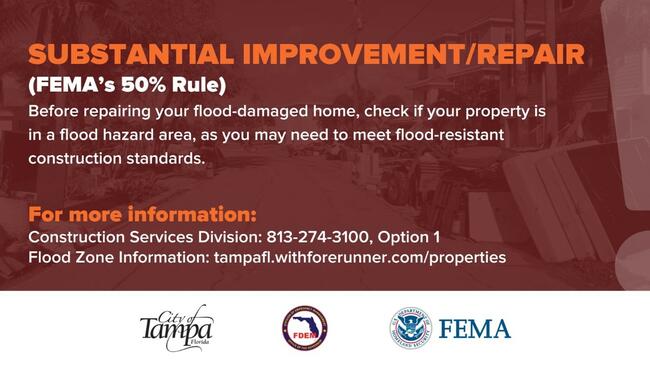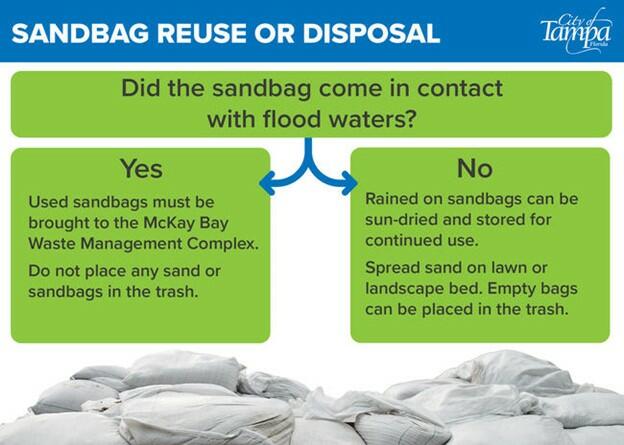Before you perform repairs to your flood-damaged home, please note that if your property is located in a flood hazard area (Flood Zone AE, Coastal A, and VE)*, you may be required (by FEMA and State of Florida requirements incorporated and applied by the City of Tampa) to rebuild to Florida Building Code flood-resistant construction standards. This determination/requirement is based on whether the required improvements/repairs are deemed a “substantial improvement” or “repairs of substantial damage,” which generally means that the improvements/repairs exceed 50% of the structure’s depreciated value pre-flood damage as listed on the Hillsborough County Property Appraiser’s listing for your property.
View Hillsborough County 50% Improvement Calculator
For answers to questions about whether your improvements/repairs are “substantial”, please contact the City’s Construction Services Division at: 813-274-3100, Option 1.
To learn more about your property’s location and relevant flood information please visit https://tampafl.withforerunner.com/properties
PLEASE NOTE: You should also contact your insurance carrier(s) and mortgage lender before making improvements/repairs, as they may have other applicable requirements.
Beware of Contractor Scams
After a disaster, qualified contractors are usually in high demand. Scammers or unqualified out-of-state workers may take advantage of Floridians in need of expert service.
If you have been approached to have work done on or at your home, you can check if that individual is licensed through the Department of Business and Professional Regulation (DBPR) or by going to myfloridalicense.com.
If property is damaged from the storm, the Florida Attorney General’s Office offers these tips when hiring a contractor:
- Insurance evaluation - Ensure repair work will be covered under your insurance policy. Have an insurance company evaluate damage before arranging repairs.
- Estimates – Obtain at least three written, itemized estimates on bids or repairs
- Bogus offers - Watch out for unsolicited offers or contractors claiming to perform repairs at a discount with leftover supplies from another job
- Do your research – To check on a company’s reputation, look for references online or ask a friend. Also check to see if a company is properly licensed, insured, and if there are any consumer complaints filed against a licensed contractor at Florida Department of Business & Professional Regulation or by calling the Florida Attorney General’s Office at (866) 9NO-SCAM.
- Bonded - Make sure a contractor is bonded and verified with a bonding agency
Read the fine print – Although it may be daunting, read the entire contract before signing to ensure it includes the required buyer’s right to cancel language. Understand penalties that may be imposed for cancellation. - Liens - Insist on releases of any liens that could be placed on the property from all subcontractors prior to making final payments. Homeowners may unknowingly have liens placed against their properties by suppliers or subcontractors who have not been paid by the contractor. If the contractor fails to pay them, the liens will remain on the title.
- Deposits and final payment - Never pay the full amount of a repair expense upfront and be wary before providing large deposits. Do not sign a certificate of completion or make final payment until satisfied with the work performed.
Safety Tips for After a Flood
- Return home only when officials have declared the area safe. Use caution before entering your home: look outside for loose power lines, damaged gas lines, foundation cracks and other damage.
- If power lines are down outside your home, do not step in puddles or standing water. Report them to the power company.
- If you smell natural or propane gas or hear a hissing noise, leave immediately and call the fire department.
- Cleaning products, paint, batteries and fuel containers have the potential to be hazardous. Please check with local authorities for assistance with disposal.
- Keep an eye out for animals such as snakes, possums and raccoons that may have moved into your evacuated home, as they often look for relief from floodwaters.
- If you drive an electric vehicle and there are floodwaters around your home, do not drive through it. If water gets into the battery, it could potentially cause a fire.
Dealing with Damage in your home
- As soon as it's safe to return home, contact your insurance agent or company to file a claim. Photograph and list all damaged items including their age and value.
- Insurance adjusters will need evidence of damage to prepare an estimate, so take photos of water in your house, including structural, personal property and floodwater levels. You can also record serial numbers of large appliances and collect receipts for damaged items.
Prepare a Proof of Loss
- Your insurance adjuster will help you prepare a Proof of Loss, which is a sworn statement of the amount you're claiming. You'll need to file this with your insurance company within 60 days of the flood.
- You can take measures to mitigate further damage, such as tarping, but don't repair damage before your adjuster visits.
Resident Damage Self Report Form
Residents can self-report damages to help prioritize the City of Tampa's damage assessment operations using the Resident Damage Self Reporting Form. If it is an emergency situation residents should always call 9-1-1, but for other non-life-threatening damages, residents can enter the information in the form. Go to tampa.gov/SelfReport to access the form.
Florida Small Business Emergency Bridge Loan Program
The Florida Small Business Emergency Bridge Loan Program is now open! Loans up to $50,000 are now available to businesses across Hillsborough County that were impacted by Hurricane Helene. The Emergency Bridge Loan program provides short-term, zero-interest working capital loans that are intended to bridge the gap between the time a disaster impacts a business and when a business has secured longer-term recovery funding, such as federally or commercially available loans, insurance claims, or other resources. Visit floridacommerce.my.site.com/RebuildFloridaBusinessLoanFund to learn more about the program, view the lending guidelines, and required documentation, and complete an application by the Nov. 24, 2024, deadline. More information is available by calling (833) 832-4494 Monday through Friday from 8 a.m. to 5 p.m.
U.S. Small Business Administration Disaster Loans
U.S. Small Business Administration disaster loans are available for homeowners, renters, nonprofits, and businesses of all sizes affected by Hurricane Helene. There are three types:
- Home Disaster Loans: Loans to homeowners or renters to repair or replace disaster-damaged real estate and personal property, including automobiles.
- Business Physical Disaster Loans: Loans to businesses to repair or replace disaster-damaged property owned by the business, including real estate, inventories, supplies, machinery and equipment. Businesses of any size are eligible. Private, non-profit organizations such as charities, churches, private universities, etc., are also eligible.
- Economic Injury Disaster Loans (EIDL): Working capital loans to help small businesses, small agricultural cooperatives, small businesses engaged in aquaculture, and most private, non-profit organizations of all sizes meet their ordinary and necessary financial obligations that cannot be met as a direct result of the disaster. These loans are intended to assist through the disaster recovery period.
Community Partners
The City of Tampa recommends the following community organizations that are providing resources to those in need:
Food Resources
Feeding Tampa Bay is operational and distributing food from their Causeway Center. Stay tuned to their Facebook Page for details and additional pop-up sites.
Florida's Price Gouging Hotline
Attorney General Ashley Moody has activated Florida’s Price Gouging Hotline. Anyone who suspects price gouging can report it at MyFloridaLegal.com or calling 1(866) 9NO-SCAM.
Sandbag Reuse Guidance
If sandbags did NOT come in contact with floodwaters, sandbags can be reused for future preparedness. Rained on sandbags can sun-dried and stored in a dry location until time to reuse. Clean sand can also be spread in gardens or on lawns, and empty bags can be stored or disposed of.
If sandbags have come in contact with floodwaters, sandbags should not be reused due to potential contamination. To dispose of sandbags, residents should bring them to the City of Tampa McKay Bay Scale House (114 S 34th Street). Residents should NOT place sand bags in any City-issued solid waste container.




